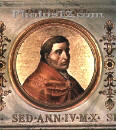 John XI is called the son of Pope Sergius III by the "Liber
Pontificalis;" but as has been mentioned in the biography of Sergius III, this
is not at all certain. Whoever his father was, John's mother was certainly the
famous daughter of Theophylactus, Mary, known to history as Marozia. (Marozia
means "little Mary".)
John XI is called the son of Pope Sergius III by the "Liber
Pontificalis;" but as has been mentioned in the biography of Sergius III, this
is not at all certain. Whoever his father was, John's mother was certainly the
famous daughter of Theophylactus, Mary, known to history as Marozia. (Marozia
means "little Mary".)
John entered the ranks of the clergy and became cardinal-priest
of Santa Maria in Trastevere. His mother Marozia now dominated the political
scene in Rome, and when Stephen VIII died, it was small wonder that her son John
should be chosen pope. John seems to have been a good young priest. Only in his
twenties, he was probably pretty much under his powerful mother's influence.
John granted privileges to the great monastery of Cluny. It is interesting to
note that at St. Odo's request, John granted privileges not only to Cluny, but
to dependent monasteries. Cluny was more than a strict and pious abbey, it was
the mother house of a congregation of monasteries. Since in the primitive
Benedictine system, the abbot of each monastery was supreme, the dependence of a
whole chain of monasteries on a mother abbey is a new departure. It proved very
useful in the stormy days of the tenth century when a monastery, left to itself,
could easily fall into decay.
Whatever John's gifts as a ruler, he had little opportunity to
exercise them. His mother Marozia naturally had strong influence over her young
son. Marozia, widowed twice, had married Hugh, King of Provence. Hugh was at
first well received by the Romans, but soon it became clear that Marozia's son
Alberic II was not happy. Rome was too small for Hugh and Alberic. Alberic
struck first. Raising a mob, he rushed in on his mother's headquarters, the
Castle of St. Angelo, with such force that Hugh fled. Alberic put his mother in
prison. He also made his brother Pope John XI a prisoner. And after this
revolution, which took place either in late 932 or early 933, Alberic ruled Rome
like a dictator. He called himself Senator, Patrician, and Prince of the Romans.
He usurped the temporal power completely and allowed his brother, the Pope, only
the exercise of his spiritual duties. Indeed even in spiritual matters he
interfered. It was at Alberic's insistence that John granted the pallium to
Theophylactus, patriarch of Constantinople, and Artaud, archbishop of Rheims.
John XI died either in December 935 or January 936. His
pontificate marks the complete supremacy in Rome of the house of Theophylactus.
Excerpted from "Popes
Through the Ages" by Joseph Brusher, S.J.

